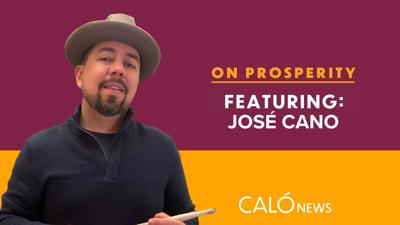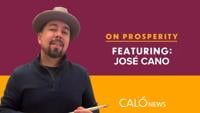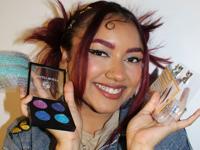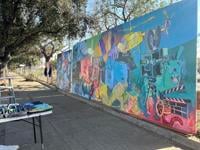
José Cano is a founder and drummer of Las Cafeteras.
José Cano is a founder and drummer of Las Cafeteras. I met a few of Las Cafeteras at Cal State Long Beach on May 22, 2012 when I produced a promo for them on my Intelatin radio program for KKJZ 88.1FM and KBeach Global Radio. When I heard their music, I placed them within the pantheon of Chicano rock and roll. Headlined by Los Lobos and supported by bands like Ozomatli and La Santa Cecilia, Chicanos have always seemed to me to be very aware of their unique identities. Whether it was Edward James Olmos on “Miami Vice” or the characters in the plays of Culture Clash, being Chicano had a style that was oftentimes iconic. Once it made its way down from the Teatro Campesino in San Juan Bautista, Chicano culture seemed to be headquartered in East L.A. I can place all the characters from my youth that made a wild impression on me in East L.A. Since then, as an adult, I have spent considerable time interviewing folks and eating in Whittier, Boyle Heights and East L.A. I view it as a rich culture but has it ever been seen as a vision of prosperity?
José had similar ideas when he was younger. He associated prosperity with white people. He tells me, “The places I lived were where Mexicans lived. In Santa Barbara, I would be surprised if I saw Latinos in those areas. The houses had more trees, more peaceful, quiet, newer cars, less trash, green stuff all over the place.”
This interview was conducted at Phillipe the Original in Downtown Los Angeles.
José's Identity: I see myself in different boxes. In Mexico, I am Mexicano. In the U.S., I am Chicano. Sometimes, I am American. My parents are from Los Altos de Jalisco.
José Cano is a founder and drummer of Las Cafeteras. Cano talks about his perspective on prosperity and his identity.
Please describe your childhood home?
I grew up in a working class home, four houses down from Orchard Park in Oxnard. If you jumped the fence in my backyard, it was an open field, an orchard. We played sports, climbed trees, played in river-beds, and rode motorcycles. It was a single family home. Three bedroom, two bathroom standard house. It was painted beige to brown to brick red, my mom never liked the house to be the same color. We had a nice driveway because my father was a concrete guy. I have an older brother and two younger sisters. We had pets, dogs, rabbits, birds, cats, lots of animals. In my mind, we were middle class. Lots of mechanics, plumbers, folks working at the grocery store. We weren’t rich and we weren’t poor but we didn’t buy fancy things. My dad was always pretty sharp even if he didn’t have a formal education. He was forward thinking and daring. I haven’t heard that they struggled to qualify for their first mortgage but they were scared of the payment.
When did you begin to travel?
We went to Mexico twice a year. We drove a red Chevy Blazer to Jalisco. I did begin to notice when I was young an economic difference between us in Oxnard and my family in Jalisco. Nobody had a car. I stood out wearing certain clothes and certain haircuts. It was noticeable. I’d get judged for it.
When did you begin to fantasize about prosperity?
I used to go to Santa Barbara and I thought it was nicer. I associated nicer places with white people. The places I lived were where Mexicans lived. It became very normal. In Santa Barbara, I would be surprised if I saw Latinos in those areas. The houses had more trees, more peaceful, quiet, newer cars, less trash, green stuff all over the place.
When did your music career begin?
I was 13 years old. I was in sixth grade. One of my friends was in the junior high band and that’s when I first became interested in playing music. I joined the concert band in junior high. I wanted to keep playing in the concert band in high school but in order to do that you had to join the marching band. I thought it was dorky to be in the marching band. I was also really into sports and at my high school you had to choose one or the other. I wanted to be with the cool crowd. But, for sure, I wanted to play percussion.
When do you move to Los Angeles?
I transferred from junior college to Cal State LA and I got my degree in Mechanical Engineering. Music was a hobby. I was a recreational musician. I would play at house parties. During Santa Barbara’s Fiesta days on State Street, I remember seeing in a bar, and I saw the drummer looking like he was having fun. I said to myself, I hope I can do that one day. Years later, I played in bands and I joined Las Cafeteras in 2005. We would get invited to play community centers, coffee shops and open mics. We played La Cita in DTLA. We had all of these conversations about whether a community band like us should play at a bar or not but we ended up going for it. It felt amazing. Since then, we have two full length albums, some EPs, some singles, and we’ve toured seven countries with our music.
Who taught you how to open an LLC for your music business, or how to purchase real estate or how to establish Trusts?
I have a degree in engineering and after a few years of working in industry I knew that I never wanted to be an employee. I knew I had to be my own boss. I worked for myself for a long time and floated around. I didn’t know very many entrepreneurs. It was a confusing time in my life. I had a friend that helped me start my first business. His name was Samuel. That is what got me interested in sole proprietorship. Once I figured out that I had all the liability for the business, I began learning a little along the way. It’s been very step by step.
Did you ever purchase real estate in L.A.?
My parents owned property and I did realize the value of it. I was living in Highland Park and I tried to convince the band that we should pool our money together and buy an apartment building. If we would have done this in 2005, it would have totally paid off. I was working as an engineer and my father tried to help me buy a fourplex in Highland Park. I had every intention of buying but we hesitated and then the 2008 recession hit so we put all of those plans on hold. Many years later in 2016, I ended up leaving L.A. and was able to buy in Oxnard after two years. I would call where I live to be lower middle class, but it's mine.
What does your home look like present-day?
When the city puts a margin in for the sidewalk, they are able to have trees. Visually, it looks so nice. My block looks dry. For me that's a big indicator for how the community feels. A lot of agricultural workers live here, paleteros, eloteros, kids with parents speaking Zapotec [and a] lot of Oaxaqueños. It’s not dangerous. It has a main house with a detached garage which is my music studio. I also built a two bedroom ADU. My brother and I live in the ADU. We have a family renting the main house. I have never lived there.
Is there a connection between your former fantasy and your current reality?
I think that I am a lot better off now than I was before. I have equity and I have positive cash flow. I don’t compare myself too much to my parent’s accomplishments. We still support each other and we share resources but I think individually, I am much better off today.
Do you still hold the opinions about the white community vs the Latino community?
Historically, a lot of things have happened that have made it easier for some communities to get ahead easier than others. We all have the possibility to achieve great things and to achieve prosperity.
Will you be inheriting the family home?
Me and my siblings are currently in the process of organizing ourselves when my parents are no longer with us. We are having those conversations with the lawyer.
New Single by Las Cafeteras: Cumbia de mi Barrio
Filmed in the heart of the Barrio, this song weaves together Peruvian Huayno, Afro-Colombian beats and Mexican rhythms to create an explosion of sounds, stories and memory that remind us of our connection to the Land, our Barrios, MOVEment and Joy. This is the 1st Single from our 3rd Full Length Album, "A Night in Nepantla" set to be released in May 2024.











(0) comments
Welcome to the discussion.
Log In
Keep it Clean. Please avoid obscene, vulgar, lewd, racist or sexually-oriented language.
PLEASE TURN OFF YOUR CAPS LOCK.
Don't Threaten. Threats of harming another person will not be tolerated.
Be Truthful. Don't knowingly lie about anyone or anything.
Be Nice. No racism, sexism or any sort of -ism that is degrading to another person.
Be Proactive. Use the 'Report' link on each comment to let us know of abusive posts.
Share with Us. We'd love to hear eyewitness accounts, the history behind an article.